APEC Policy Partnership on Women and the Economy (PPWE)
The APEC Policy Partnership on Women and the Economy (PPWE) was established in May 2011 in Big Sky, Montana, USA. It combined the former APEC Gender Focal Point Network (GFPN) and the private sector-oriented Women’s Leadership Network (WLN) to create a streamlined and effective mechanism to integrate gender equality and women and the economy concerns, and elevate the influence of women’s economic issues in APEC.
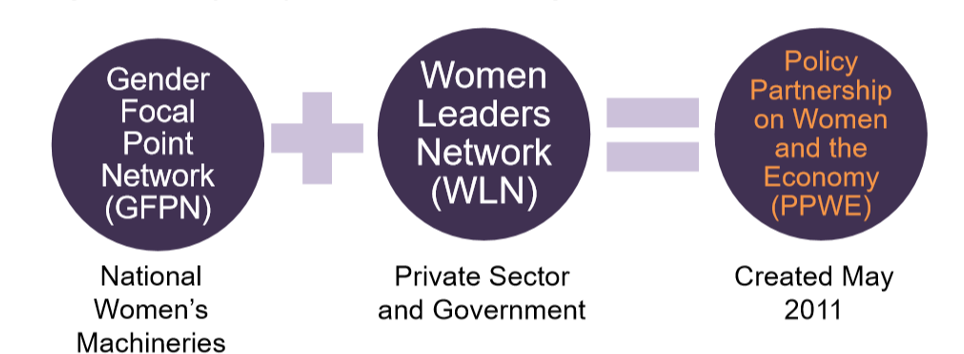
The PPWE works to address five key pillars that impact women’s economic empowerment:
- Access to capital
- Access to market
- Skills and capacity building
- Women’s leadership and agency
- Innovation and technology
In the Philippines, the PPWE Steering Committee is composed of representatives from the PCW (as Chair and Secretariat as of September 2017), the Department of Trade and Industry – Resource Generation and Management Service (DTI-RGMS) and the Women’s Business Council Philippines (WBCP/ WomenBiz).
The PPWE meets twice every year during the First PPWE Meeting (PPWE1) and the Women and the Economy Forum (WEF), a series of week-long meetings where ministers, senior business leaders and experts review progress of the women and the economy agenda.
Some notable achievements of PPWE through the years:
- APEC Healthy Women, Healthy Economies (HWHE) (2014) – Initiated by the US, this initiative involves the PPWE, the APEC Health Working Group (HWG) and the APEC Human Resources Development Working Group (HRDWG). It has improved women’s health through public-private partnerships. The HWHE Policy Toolkit is a compendium of the issues, actions, and implementing elements for improving women’s health across five areas: (1) workplace health and safety; (2) health awareness and access; (3) sexual and reproductive health; (4) gender-based violence; and (5) work/life balance.
- APEC HWHE Research Prize (2019) – The APEC HWHE Research Prize was created by Chile, with support from Merck, to recognize research that enables policy makers, business leaders, and others to identify and implement measures to improve women’s health in APEC economies so women can join and rise in the workforce.
The inaugural HWHE Research Prize 2019 was awarded to a Filipina, Dr Veronica Ramirez, Assistant Professor at the University of Asia and the Pacific, for her study on health needs of Filipino migrant workers.
- Individual Action Plan (IAP) for the Enhancement of the Ratio of Women’s Representation in Leadership (2015-2020) – Japan’s initiative to gather data across the APEC economies on women’s representation in leadership and decision-making positions runs from 2015-2020. A final study will be conducted in 2021.
- APEC Business Efficiency and Success Target (BEST) Awards (2016) – Russia’s project seeks to distinguish, spread and encourage the best practices of women-owned SMEs across APEC economies through the collection and systemization of the experience of individual economies and, particularly, through organization of a competition of the APEC BEST women’s projects and their corporate success stories.
Since its inauguration, the Philippines has nominated women entrepreneurs to the APEC BEST Awards. In 2016 with Peru as APEC host economy, Ms Anya Lim of Anthill (Alternative Nest and Trading/Training Hub for Indigenous/Ingenious Little Livelihood seekers) won a special prize from the jury. The following year in Viet Nam, Ms Bernadette De Los Santos of the BidiBidi Enterprise won the Best Green Economy Project Award. In 2018 in Papua New Guinea, Ms Zarah Juan, founder of Green Leaf Eco Bags, Inc., was awarded the Most Innovative Business Model Award. Finally, at the APEC BEST Awards 2020 held in Chile, Ms Dalareich Polot, founder of the Dalareich Chocolate House in Bohol, won the Best Family Business Support Award.

Anya Lim of Anthill, Special Prize from the Jury 2016 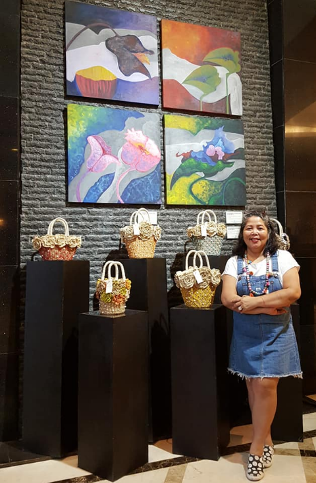
Bernadette De Los Santos of BidiBidi Enterprise, Best Green Economy Project Award 2017 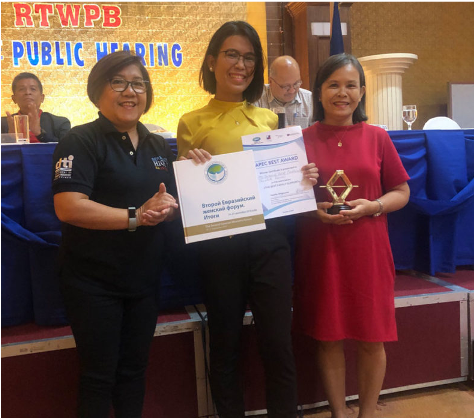
Dalareich Polot (center) of Dalareich Chocolate House, Best Family Business Support Award 2019 with DTI Regional Director Aster Caberte (left) and Ms Polot’s mother (right) 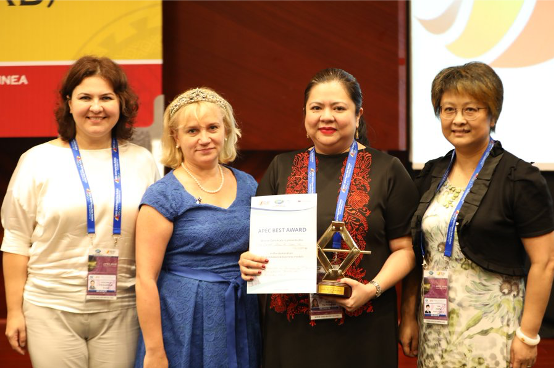
Zarah Juan (second from right) of Green Leaf Eco Bags, Inc., Most Innovative Business Model Award 2018 with APEC BEST jury members
- APEC Gender Inclusion Guidelines (GIG) (2017) – Led by Viet Nam, the GIG offers guidance on integration of gender-responsive approaches into other fora’s plans, reports and projects.
- Women as Prime Movers of Inclusive Growth (2018) – Led by the Philippines through the DTI-RGMS and WomenBiz, this project looked into the aspect of inclusive business both in theory and in practice, and its effects on women’s economic empowerment through a survey, documentary reviews, and a seminar-workshop to compile success stories and best practices of APEC member economies.
- La Serena Roadmap on Women and Inclusive Growth (2019) – Led by Chile, the Roadmap was adopted in 2019, Chile’s APEC hosting year and the first time that “women and inclusive growth” was featured as a host economy theme.
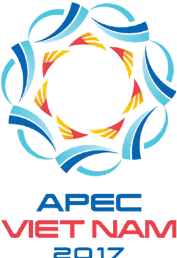 | 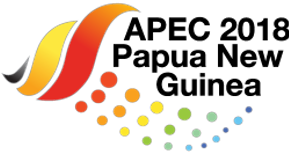 | 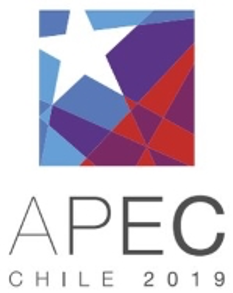 |
| 2017 | 2018 | 2019 |
| “Creating New Dynamism, Fostering a Shared Future” | “Harnessing Inclusive Opportunities, Embracing the Digital Future” | “Connecting People, Building the Future” |
| Priorities: | Priorities: | Priorities: |
| Sustainable, Innovative and Inclusive APEC community | Improving Connectivity, Deepening Regional Economic Integration | Digital Society |
| Regional Economic Integration | Promoting Sustainable and Inclusive Growth | Integration 4.0 |
| Competitiveness and Innovation of MSMEs in the Digital Age | Strengthening Inclusive Growth through Structural Reform | Women, SMEs and Inclusive Growth |
| Food Security and Climate Change | Sustainable Growth |
Other PPWE projects focus on women in non-traditional sectors such as energy, mining, agriculture, and science, technology, engineering and mathematics (STEM); bridging the digital gender divide in the region; and supporting women-led micro, small and medium enterprises (MSMEs).
The annual Women and the Economy Forum (WEF) adopts a theme which will become the focus of the meetings and the PPWE ministers’ WEF statements.
| APEC Host Economy and Year | WEF Theme | WEF Statement |
 | “Creating New Dynamism, Fostering a Shared Future” | Enhancing Women’s Economic Inclusion and Empowerment in the Changing World |
 | “Seizing Opportunities for Women and Girls to Advance in the Digital Age” | Seizing Opportunities for Women and Girls to Advance in the Digital Age |
 | “Advancing the Inclusion of Women in the Economy” | 2019 APEC Women and the Economy Forum Statement |
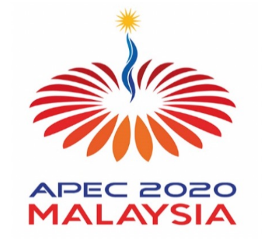 | TBC | TBC |
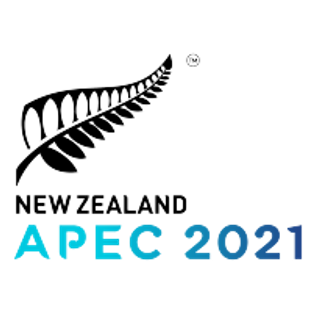 | TBC | TBC |

